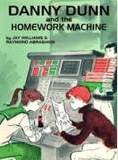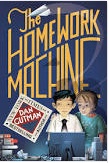I clearly remember reading Danny Dunn and the Homework Machine. The basic story is that  Danny really doesn’t want to do his homework. He and his mom live with Professor Bullfinch who is building a computer for NASA. As I recall after the Professor explains the machine to Danny, he gets together with his friends Joe and Irene and they decide to use the computer to do their homework. Do I remember all the ins and outs of the story? No. I remember that once it was found out, Danny and his friends were in trouble. There were consequences. However, I clearly remember the Professor suggesting that actually there was no harm, no foul. Why? Because in order to program the computer to do their homework, Danny et al had to learn the material and then figure out how to input and make it come out right. The lesson that I took away was that there was NO easy WAY to get around doing homework. Like it or not. Do well at it or not. It was a necessary evil of the education system and someday I would see a benefit.
Danny really doesn’t want to do his homework. He and his mom live with Professor Bullfinch who is building a computer for NASA. As I recall after the Professor explains the machine to Danny, he gets together with his friends Joe and Irene and they decide to use the computer to do their homework. Do I remember all the ins and outs of the story? No. I remember that once it was found out, Danny and his friends were in trouble. There were consequences. However, I clearly remember the Professor suggesting that actually there was no harm, no foul. Why? Because in order to program the computer to do their homework, Danny et al had to learn the material and then figure out how to input and make it come out right. The lesson that I took away was that there was NO easy WAY to get around doing homework. Like it or not. Do well at it or not. It was a necessary evil of the education system and someday I would see a benefit.
The story was written in the late 50’s, I was twelve. I think I got it from the Scholastic Book Fair as it came through Villa Cabrini. I still have a number of the books I got. I was more a library person, because I went through books so quickly and I am not a re-reader. EVER.
Fast forward to today. Digital libraries allow me to read whatever whenever. I love it. Trawling through the NC Digital Library I came across Dan Gutman’s The Homework Machine  and I thought wow, how cool. But how would it be different? Because today computers are big and small and ubiquitous. And children, from my two year old grands on up, find nothing strange in pictures on a small 2 inch by four inch screen, and smile automatically when a phone is held up near their face. We Google everything when we are at a loss. We don’t use calculators. We do research in bytes. Yep, it’s different.
and I thought wow, how cool. But how would it be different? Because today computers are big and small and ubiquitous. And children, from my two year old grands on up, find nothing strange in pictures on a small 2 inch by four inch screen, and smile automatically when a phone is held up near their face. We Google everything when we are at a loss. We don’t use calculators. We do research in bytes. Yep, it’s different.
The story is written as an after-the-fact testimony of events leading up to the discovery of the ‘creation’, really programing and use of the homework machine in completing the homework assignment of four kids. Benton has programmed his computer to scan homework assignments [this is fifth grade] and then print the answers in a simulation of his own handwriting. Ergo, he never does homework, this allows him to work on projects more suited to his high intellect and interest. Reclusive tho he is, he does become friends with his seatmates and eventually tells them of his homework machine. Pretty soon they are all using it. They love it, they have more free time after school, they are getting good grades, they are and aren’t bonding as a group. But importantly, the adults think they are doing just fine and no one seems to question this about face for two of the most challenged students in this group of four, Sam and Kelsey.
Now all the time I’m reading this I’m trying to figure out what gives here, where does this story go? The teacher is a new teacher, all unicorns and rainbows about how wonderful the students are, how great it is that her desire to have Benton have friends is actually working. How the whole class stands behind Sam when his Dad dies in the middle east. And even though there is some mention of her talking to the more seasoned teachers, when she follows the advice she is clumsy about following through. SPOILER ALERT. In the end the kids get caught but at the end of the year! So this is a long, long time, the entire fifth grade. The parents take some of the blame [we were happy Benton had friends]. The teacher takes some of the blame [I should have recognized sooner that something different was taking place]. The kids appear to know that they were cheating [at one point Judy, when she thinks they will be caught, talks about how this may be morally wrong]. They threw the computer into the Grand Canyon [their only real punishment was that they had to go to the bottom of the canyon and pick up all the pieces.] They lied to the principal. Additionally, they were watched by a man who wanted to exploit their intelligence and their talent, well, Benton’s. They opened a door to a total stranger and let him in the house.
Here is where I think this book is a massive fail, MASSIVE. Sam and Kelsey failed a comprehensive test at the end of the year after turning in perfect homework assignments all year long. Even Judy, the second brightest, gets a C. There are no, NO, consequences–No talk of summer school. No talk of the fact that they just blew off fifth grade. No talk about what they DON’T KNOW!!!
Unlike the book of the 1950’s, this homework machine becomes an AI [so we are led to believe] and, according to the kids, must be destroyed, hence, the tossing in the Grand Canyon. Yes, the teacher was stupid–giving a really bad name to incoming teachers–and yes, the parents gave far too much latitude to the students–even in the 50s when we were allowed more freedom than today’s kids not sure we would have been able to pull off this stuff about school-school was important. The path to success. Teachers were believed way, way, way before the kid. These are not fifth graders [dating, holding hands, ‘lovey dove’???] and if they are, we as a country are in far more trouble than I thought. The end?
BRENTON DAMAGATCHI, GRADE 5 I opened the door. What else could I do? The man was just standing there. JUDY DOUGLAS, GRADE 5 Basically, the guy wanted Brenton to help him trick kids. He wanted Brenton to spread the word that certain products were cool, so his clients could make more money. I didn’t think it was very nice and I told him so. BRENTON DAMAGATCHI, GRADE 5 I thought it over. I told the guy I’d like to go into business with him. Judy was really mad. Then I told the guy I didn’t want to sell toothpasteand I didn’t want to sell clothes or CDs or video games. He says, “Well, what do you want to sell?” I told him I don’t want to sell some product to the kids of the world. I want to sell an idea. A really good idea that I’d been working on in my head.The guy was all excited. He asks, “What’s the idea? What’s the idea?” I looked around like it was a big secret that I didn’t want anyone else to hear. Then I whispered it in his ear: “Do your homework.” The guy left. I don’t think he’ll be bothering us anymore. Gutman, Dan (2009-10-27). The Homework Machine Simon & Schuster Books for Young Readers.
So the answer in the book is ‘do your homework’? Why? What for? If you don’t, then what? If you invent a machine and are a bit smarter than these four kids and you can figure out a way to NOT get caught, then WooHoo? Not that I want a moral tag. I may be exaggerating, but this book gives credence to the idea that the younger generation is NOT smarter, just able to access information faster. And, there are so many things here that I, as a parent seeing my kid read this book, would want to have long discussions about. Lying. Cheating. Opening the door to strangers. Just as starters.
Sad. Could have been a cool book. A story that hard work can pay off. But no. Not here!